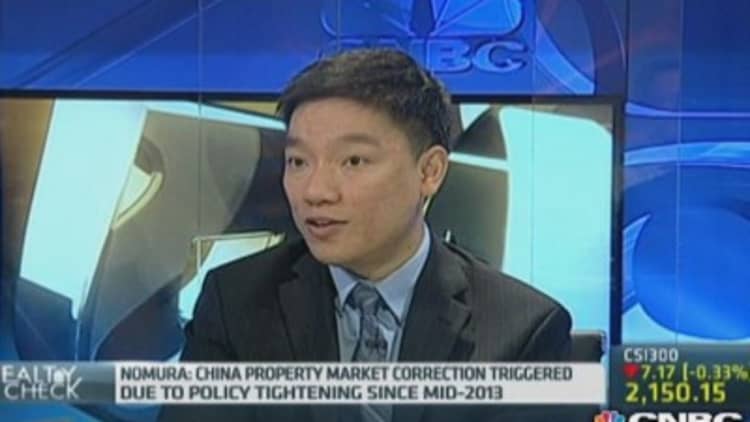
Calling China's property market a popping bubble might make for catchy headlines, but it isn't clear analysts really believe a massive downturn is on the cards.
"China faces a property overinvestment problem and there's a correction that's already started," Zhang Zhiwei, chief China economist at Nomura, told CNBC. "That's essentially what's already happened in the first four months" of the year, he noted.
Read More China developers rush overseas amid shaky home market
But Zhang said while the headline of the Wall Street Journal article about Nomura's latest property report, "China's Property Bubble Has Already Popped, Report Says," was "catchy," his report never used the words bubble or pop.
China's property sector makes up around 25 percent of its economy, according to many analysts' estimates; the segment is closely watched for cues about the direction of the world's second-largest economy.
"It's the most important sector in the economy, supporting growth and supporting government revenue," Zhang noted.
He said the property correction could deepen and Nomura's worst-case scenario of 6 percent gross domestic product (GDP) growth is possible if the government sticks with its current policies, but he noted that's not the bank's base case.
Read MoreUrbanization plan could further cool China property
"Our base case is that the government will soon resort to more aggressive policy easing, partly offsetting the slowdown in property investment growth by boosting other parts of the economy, and resulting in 7.4 percent GDP growth this year," Nomura said in the property report published Monday. "However, more policy easing in the next few months will be critical, as the property correction could snowball."
The report cited data showing property investment growth in the first quarter slowed to 16.8 percent on year from the fourth quarter's 19.9 percent.
Read More Will a weaker yuan heighten China's property risks?
Zhang isn't alone in expecting the mainland's property market could avoid a crash even as prices and sales slow.
"The Chinese property market does show signs of bubble, in the form of prices being too high in tier-one cities and with inventory levels too high for lower tier cities," Dong Tao, an analyst at Credit Suisse, said in a note Tuesday. He attributes much of the property slowdown to the current anti-corruption campaign damping purchases, weighing on prices and increasing supply.
"Recent price cuts have further weakened incentives for home buyers to enter the market," he said. "This means lower transaction volumes and profits for developers, but may not necessarily mean slower housing construction activities."
After buying a lot of land last year, developers are likely to accelerate their construction and selling, despite lower prices, to get cash back, he said.
Read MoreChina real estate to slow—the question is how much
"We do see rising credit risk in the property sector, but expect local government to ask developers (mostly state-owned enterprises) to buy landbank from failing developers, so the downward pricing pressure is unlikely to be dramatic at this stage," Tao said.
He also expects Beijing will allow more local government-driven easing of property tightening measures, although there isn't likely to be any announcements from the national level.
—By CNBC.Com's Leslie Shaffer; Follow her on Twitter @LeslieShaffer1

